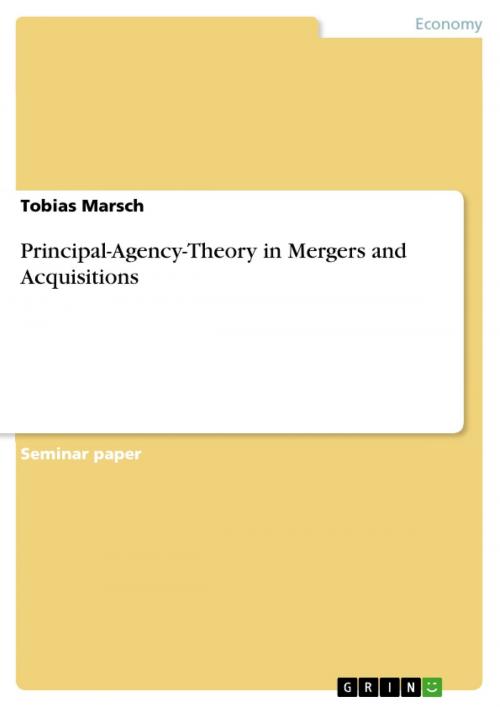| Author: | Tobias Marsch | ISBN: | 9783668009615 |
| Publisher: | GRIN Verlag | Publication: | July 1, 2015 |
| Imprint: | GRIN Verlag | Language: | English |
| Author: | Tobias Marsch |
| ISBN: | 9783668009615 |
| Publisher: | GRIN Verlag |
| Publication: | July 1, 2015 |
| Imprint: | GRIN Verlag |
| Language: | English |
Seminar paper from the year 2015 in the subject Business economics - Controlling, grade: 2,0, , language: English, abstract: In times of globalization and increasing competition there are a lot of new big challenges for companies and their chief executive officers (CEO). High cost pressure, new competitors and the desire for a growing shareholder value are the challenges of global competitiveness. After exhausting all opportunities of internal optimization potentials the only way for many companies to grow or to ensure survival is to merge with other companies. The CEOs of the companies try to manage the growing requirements by extending the business portfolios or even acquiring whole companies. So in 2013 in Germany the number of Mergers & Acquisitions (M&A) was the highest for five years. A study of the Boston Consulting Group says that from 1988 to 2010 more than 26.000 transactions were realized. This figure confirms the high importance of that method. But are M&A the panpharmacon to handle the changing global markets and to ensure the prospective success of the companies? If you have a detailed look at the results you can recognize that a large number of executed M&A did not satisfy the expectations or even destroy value. The risks are all too frequent just underestimated. Often the failure is due to information asymmetry of the acting partners. This effect is called the principal-agency-problem. What is the reason for that and why do so many M&A fail? What are the real goals of the participants of such an M&A-process? Do all participants pursue the same objectives or are there maybe any other intentions in the case? The following assignment deals with the M&A-process in relation to the principal-agency-theory and shows some solution approaches to avoid bad surprises for all participating companies after an executed M&A-process.
Seminar paper from the year 2015 in the subject Business economics - Controlling, grade: 2,0, , language: English, abstract: In times of globalization and increasing competition there are a lot of new big challenges for companies and their chief executive officers (CEO). High cost pressure, new competitors and the desire for a growing shareholder value are the challenges of global competitiveness. After exhausting all opportunities of internal optimization potentials the only way for many companies to grow or to ensure survival is to merge with other companies. The CEOs of the companies try to manage the growing requirements by extending the business portfolios or even acquiring whole companies. So in 2013 in Germany the number of Mergers & Acquisitions (M&A) was the highest for five years. A study of the Boston Consulting Group says that from 1988 to 2010 more than 26.000 transactions were realized. This figure confirms the high importance of that method. But are M&A the panpharmacon to handle the changing global markets and to ensure the prospective success of the companies? If you have a detailed look at the results you can recognize that a large number of executed M&A did not satisfy the expectations or even destroy value. The risks are all too frequent just underestimated. Often the failure is due to information asymmetry of the acting partners. This effect is called the principal-agency-problem. What is the reason for that and why do so many M&A fail? What are the real goals of the participants of such an M&A-process? Do all participants pursue the same objectives or are there maybe any other intentions in the case? The following assignment deals with the M&A-process in relation to the principal-agency-theory and shows some solution approaches to avoid bad surprises for all participating companies after an executed M&A-process.















